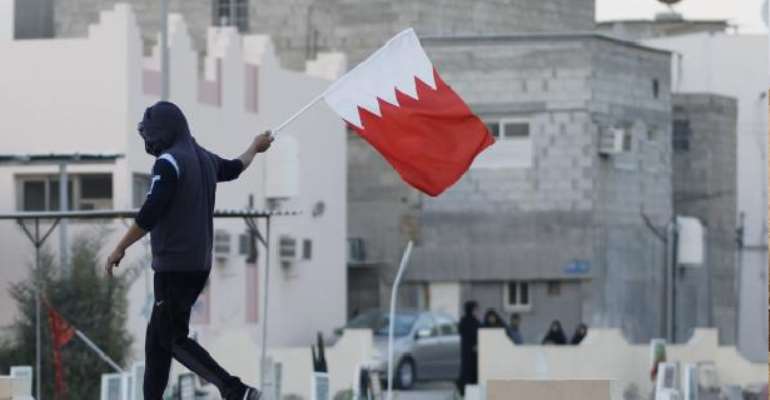Bahraini Policeman Dies From Bomb Wounds In Day Of Protest

A Bahraini policeman died on Saturday after being wounded in a bomb explosion during protests to mark the third anniversary of a pro-democracy uprising led by majority Shi'ite Muslims.
The Interior Ministry said the policeman was one of four wounded by "terrorist" blasts on Friday.
"Some villages saw rioting, vandalism and the targeting of policemen.
This required police to respond to these criminal acts with legal means," the ministry said, adding that 26 suspected rioters and vandals had been arrested the same day.
Dozens of protesters demonstrated in different parts of the island, throwing stones at police firing tear gas.
Bahrain, with Saudi help, crushed the demonstrations that began on February 14, 2011 inspired by Arab uprisings elsewhere, but has yet to resolve the conflict between majority Shi'ites and the Sunni-led monarchy they accuse of oppressing them.
The ruling family has launched a third round of dialogue with its opponents, but no political agreement is in sight.
Shi'ites were expected to join more protests on Saturday organized by the main opposition al-Wefaq movement.
The Interior Ministry said extra police had been deployed and would "respond to attempts to riot or to vandalize property".
The Bahraini authorities, along with their Saudi backers, view Shi'ite demands for political reform as Iranian-inspired subversion.
Their handling of the unrest has embarrassed the United States, which has had to balance its support for an ally that hosts its Fifth Fleet against human rights concerns.
"Three years since the start of the protests, we have seen no peace," said a 34-year-old clerk in Saar village who gave his name only as Abu Ali.
"Every day.
.
.
youngsters go out and burn tires on the roads and the police attack them with teargas.
" DIALOGUE ON ROPES Crown Prince Sheikh Salman bin Hamad al-Khalifa, a relative moderate in the Sunni al-Khalifa family that has ruled Bahrain for more than 200 years, stepped in last month to try to revive a dialogue that the opposition had boycotted for four months.
Royal Court Minister Sheikh Khaled bin Ahmed al-Khalifa has since met opposition leaders and other figures, but formal talks have yet to resume and the two sides still seem far apart.
"Each of the country's three main political conflicts - opposition versus government, Sunnis versus Shi'ites and reformists versus obstructionists within the ruling family - continues unabated," said Justin Gengler, a Bahrain expert at Qatar University.
The opposition had boycotted the talks after the government investigated at least two of its leaders on incitement charges.
Concern is rising that young Shi'ites will resort more and more to violent militancy if mainstream opposition leaders fail to advance a political settlement that would give Shi'ites a bigger say in government and improve living conditions.
A tiny Gulf archipelago of 1.
7 million people, Bahrain has been in turmoil since the original revolt.
The government says it has implemented some reforms recommended by international investigators and that it is willing to discuss further demands.
Shi'ites want wider-ranging democratization, entailing cabinets chosen by an elected parliament rather than appointed exclusively by the king.
They also call for an end to alleged discrimination in jobs, housing and other benefits.
The government denies any policy of marginalizing Shi'ites.
Al-Wefaq leader Sheikh Ali Salman blamed the stalemate on what he called the government's preference for security crackdowns over a genuine political opening.
"Had wisdom been used by the government, there wouldn't be a popular revolution, and a political solution would have been reached in the first few months," he told Reuters on Friday.
Information Minister Samira Rajab said dialogue would go on, blaming "terrorists" for the clashes of the last few days.
REUTERS
